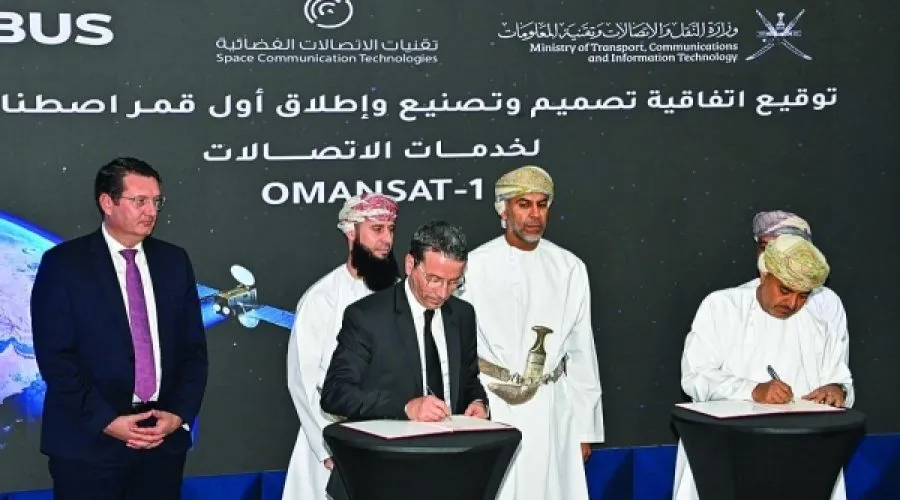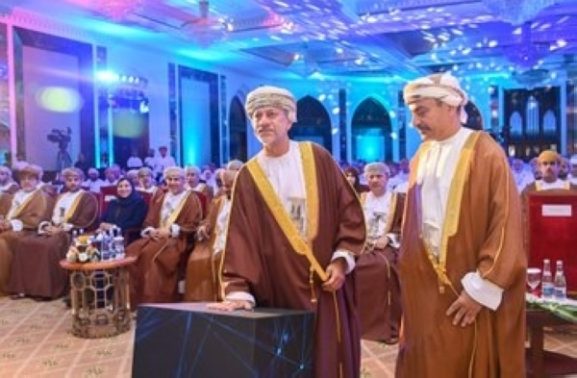Oman Inks Pact with Airbus for OmanSat-1: Implications for Investment and Technological Advancement in the Country
MUSCAT: The Ministry of Transport, Communications and Information Technology (MoTCIT) has entered into a cooperation agreement with Airbus Defence and Space (ADS) for the design, manufacture, and launch of Oman’s inaugural communications satellite, OmanSat-1. This initiative is part of the country’s broader effort to enhance the telecommunications sector, reinforce digital sovereignty, and develop national capabilities in space and advanced technologies.
The agreement was signed by Eng. Said bin Hamoud al Maawali, the Minister of MoTCIT, and Alain Fauré, Head of Space Systems at Airbus.
Airbus will craft OmanSat-1 utilizing high-capacity Ka-band frequency technology, which will cover not only Oman and its economic waters but also extend its reach across the Middle East, East Africa, and Asia. The satellite will employ Airbus’s OneSat platform, allowing for complete digital reconfigurability while in orbit.
Under this agreement, the Ministry has designated Space Communications Technologies (SCT), a wholly-owned subsidiary of the Oman Investment Authority, as the national operator for the satellite post-launch. SCT will also carry out executive functions during the design and manufacturing phases. To facilitate this, a Project Management Office has been established within SCT to manage administrative and technical aspects in partnership with Airbus, ensuring readiness for satellite operations and aiding in the development of a fully integrated operational ecosystem in Oman for satellite management and service delivery to both public and private entities after the launch.
With OmanSat-1, the Sultanate is poised to establish a sovereign and secure digital future supported by national space infrastructure. Al Maawali remarked that the project aims to bolster Oman’s digital sovereignty by creating a national space-based framework capable of providing independent and secure telecommunications and data services. This endeavor will enhance national cybersecurity, ensure the continuity of critical services under various conditions, extend coverage to rural areas, and improve the quality of telecommunications and internet services in line with Oman Vision 2040.
The project also emphasizes building future national capabilities. The Minister noted that it represents a significant advance in localizing technical expertise, training Omani talent at all project stages, empowering local companies—especially SMEs—and fostering scientific collaboration between local universities and Airbus Defence and Space.
As Oman ventures into the space economy with its first national satellite program, Airbus underscored the need for sustained collaboration to develop sovereign capabilities.
Alain Fauré stated that the contract would endow Oman with world-class, flexible satellite communications through its first geostationary satellite. He reiterated Airbus’s commitment to collaborating with SCT to facilitate the advancement of Oman’s national satellite program and the development of sovereign capabilities for future clients.
Oman is making a strategic leap toward establishing a space-driven digital economy. Dr. Ali bin Amer al Shaithani, Under-Secretary for Communications and Information Technology at MoTCIT and Head of the Negotiation Committee, characterized this project as a transformational milestone in Oman’s technological and space growth. He emphasized its potential to strengthen the national telecommunications sector, enable vital industries, and support digital transformation and smart services. He also acknowledged SCT’s role in ensuring knowledge transfer and building national capacity.
As Oman accelerates its ambitions to develop a competitive regional space sector, this project stands as a foundational element in its long-term plans for space technology and economic diversification. Dr. Saoud al Shoaili, Head of the National Space Programme and Project Management Office, highlighted that the project is a cornerstone of the National Space Strategy (2023–2033), aimed at positioning Oman as a “regional gateway for space services and technologies” that facilitate economic diversification and maximize the sector’s contribution to GDP while expanding national space services.
Eng. Salim al Alawi, CEO of Space Communications Technologies, expressed pride in the trust placed in them by MoTCIT and the Oman Investment Authority to operate and manage this national project. He described it as a pivotal moment in the evolution of satellite communications in Oman and assured a close collaboration with Airbus to implement the project according to the highest global standards.
Special Analysis by Omanet | Navigate Oman’s Market
Oman’s agreement with Airbus to launch OmanSat-1 represents a pivotal shift toward digital sovereignty and infrastructure development, positioning the nation to enhance its telecommunications capabilities and support critical services across its economic landscape. This initiative not only opens opportunities for local SMEs and expertise in the space sector but also signals strategic risks for businesses heavily reliant on traditional communication frameworks, urging them to adapt to emerging technologies. Smart investors should focus on partnerships in tech innovation, as the satellite program is set to bolster Oman’s economic diversification and GDP contribution through enhanced service delivery.



